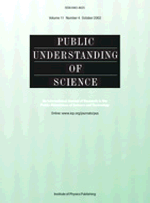Study: Do the Terms “Global Warming” versus “Climate Change” Matter to Public Perceptions?

In the latest issue of the journal Public Understanding of Science, Lorraine Whitmarsh from the Tyndall Centre for Climate Change Research in the UK, publishes a study that finds that the terms “climate change” versus “global warming” matter to public perceptions. In a mail survey of a representative sample of 590 residents from the Portsmouth, UK region, Whitmarsh gave half the participants a questionnaire asking them to evaluate the risks and impacts of “climate change” and the other half of the sample a questionnaire asking them to evaluate the risks and impacts of “global warming.”
From the article, here’s a summary of the findings:
The term “global warming” is more often associated with:
● heat-related impacts–in particular, temperature increase and melting icebergs and glaciers;
● human causes–including pollution, carbon dioxide and other greenhouse gases, CFCs, fossil
fuel consumption, cars/traffic fumes, and overuse or misuse of earth’s resources;
● ozone depletion and increased ultraviolet (UV) light penetration of the atmosphere;
● trapping of heat or gases within the atmosphere and the “greenhouse effect.”
The term “climate change” is more readily associated with:
● a range of impacts on climate and the weather, including hotter summers, wetter winters,
increased rainfall and drought, and impacts on agriculture/food supply;
● impacts that have already been observed;
● natural causes.
Later in their conclusion, they provide this additional summary of their findings:
“Global warming” is more often believed to have human causes and tends to be associated with ozone depletion, the greenhouse effect and heat-related impacts, such as temperature increase and melting icebergs and glaciers. The term “climate change” is more readily associated with natural causes and a range of impacts. Furthermore, the term “global warming” evokes significantly more concern, and is rated as “very important” by more respondents, than the term “climate change.” Finally, more people consider individual or public action to be an effective means of tackling “global warming than do so for “climate change”; while a higher proportion believe planting trees could mitigate “climate change” than it could mitigate “global warming.”
The study provides evidence for what many people have surmised: That labels do matter to the climate change debate. The local population of Portsmouth sampled in this study is obviously not representative of the national audiences in the UK and the US, but my strong hypothesis would be that a similarly designed study in the US is likely to turn up similar key perceptual differences. Indeed, as part of his audience research earlier this decade, conservative strategist Frank Luntz recommended that switching terms from “global warming” to “climate change” would be an effective way for climate skeptics to downplay the urgency of the issue.
The thorny question is what to do about this perceptual reality? For one, the more scientifically accurate term is climate change, so from an ethical standpoint, it would be wise for science institutions and scientists to stick with this label, despite the less impactful nature of the phrase. On the other hand, if you are a political strategist working to mobilize concern on climate change, switching to the phrase “global warming” might be to your advantage.
Still, we are likely to be stuck with each of these interchangeable and imperfect labels moving forward. Coming up with a third phrase such as the “climate crisis” or ” dangerous climate disruption” is unlikely to earn widespread adoption and may strike key audiences as an attempt at political marketing, undercutting credibility and public trust. Moreover, we have little to no data on the effectiveness of these alternative terms. Indeed, a term such as the “climate crisis,” or even the emphasis on “dangerous disruption” might spark immediate resistance among some key swing audience segments, who may dismiss the terms as alarmist.




